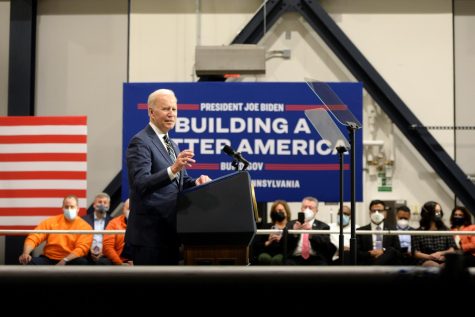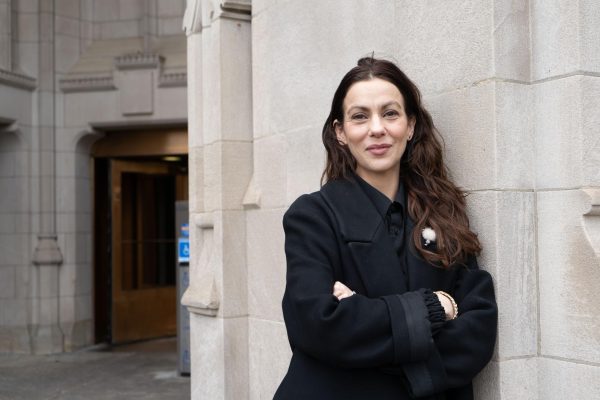Pitt officials say University could drop state-related status
March 14, 2012
Pitt’s 46-year run as a state-related institution might soon come to an end.
Since 1966,… Pitt’s 46-year run as a state-related institution might soon come to an end.
Since 1966, Pitt’s status as a state-related university has meant that in return for appropriations from the state, the University provides more reasonable tuition levels than Pennsylvania’s private universities. It also allows the University to run programs, such as public health outreach efforts, that benefit the Commonwealth.
But, with Gov. Tom Corbett’s proposed budget threatening to significantly decrease the state’s appropriations to Pitt for the second year in a row, University officials have said that the prospect of returning to the status of a private university is on the table.
“Basically, we’re being pushed in the direction of being private universities,” Chancellor Mark Nordenberg said of the four Pennsylvania state-related schools — Pitt, Penn State, Temple and Lincoln University — when testifying before the Pennsylvania House Appropriations Committee on Feb. 22.
Charles McLaughlin, Pitt’s director of Commonwealth Relations, said a change to private status would mark a change in the University’s core mission.
According to McLaughlin, this change in mission would likely include a rise in tuition and an end to a differential between in-state and out-of-state tuition. It would also mean fewer community outreach programs and the dismantling of smaller University departments and Pitt’s regional campuses. He did not specify which departments might get cut.
“The Chancellor loves the public mission, but this is our eighth cut in 12 years,” McLaughlin said. “To maintain the integrity of the University and the strength of the University, we have to consider not being affiliated with the state.”
McLaughlin predicts that, at the current rate of reduction, the private status might come in about two years.
“Hopefully that’s not where we’re going. Hopefully we’ll be able to maintain state funding. Hopefully we’ll be able to turn this around,” he said.
McLaughlin said that becoming a private university would be a last resort because of the damage it would cause in costs to the accessibility of higher education for Pennsylvanians.
“That loss would outweigh any benefit to being a private school,” he said.
Pennsylvania Sen. Jim Ferlo, D-Highland Park, a member of both the state Senate Appropriations and Education committees, said he believes that Pitt’s transformation into a private school would be a “terrible thing for our Commonwealth.”
“If Pitt becomes private, there’s no guarantee how many Pennsylvanians won’t be able to take advantage of a Pitt education. More tuition could prove cost-prohibitive. College loans already make up $1 trillion in debt nationally. God forbid Pitt go private and add even more to that debt,” the senator said.
Despite talk of Pitt becoming private, McLaughlin said he remains assured the moment of emancipation has not arrived just yet.
“I don’t believe we’ve reached that threshold,” he said. “If the current 30 percent cut held and then predictions of continued decline in Commonwealth appropriations held true, I can see a time in the future where we see the University’s elimination from the state budget.”
State Sen. Jake Corman, R-Centre, wasn’t available for immediate comment. Corman, whose district is home to Penn State University’s main campus, previously spoke out against Corbett’s proposed cuts and said state-related universities should be spared any further reductions to funding.
Corbett’s press office did not respond to requests for comment.
Corbett’s proposed 30 percent cut to Pitt’s state funding would reduce the University’s appropriations from $136 million to $95.2 million for the coming fiscal year.
Ferlo said that there is a group of senators who also feel strongly about this issue.
“These cuts are so deep even the Republican chairman [of the Senate Appropriations committee] Jake Corman opposes them. We have some allies here,” he said.
Among those allies is the minority chairman of the House Appropriations Committee, Rep. Joseph Markosek, D-Allegheny.
“I will be working with other legislators to restore at least some of the devastating funding cuts Gov. Corbett wants to impose on Pitt, Penn State and Temple University,” Markosek said in an email. “Modern workplaces require most workers to have advanced skills. We should be investing in our institutions of higher education to ensure that students can succeed in the workplace as the economy continues to recover.”
The state House and Senate must each draft its own budget proposal and agree on a final number before Corbett signs the budget into law in June.
Last year, Corbett originally proposed a 50 percent reduction in state funding for Pitt. By the time the state passed the budget in June, the cut was reduced to 19 percent, leaving Pitt with $136 million in state appropriations, one-fifth of an allotment less than it received in 2010.
After last year’s appropriation cuts, in-state tuition at Pitt rose 8.5 percent, or $1,196, and out-of-state tuition rose 4 percent, or $948.
Susan Hansen, a Pitt political science professor who specializes in state and local politics, said she believes Pitt becoming a private university is a very real possibility.
“I think the chances have improved considerably,” Hansen said. “We’ve faced such draconian cuts three or four years in a row. Now that the University is getting so little funding from the state, I think that the decision has to be, ‘Do we want to continue to work under legislative guidelines?’”
Despite acknowledging the logic in Pitt’s warnings of privatization, Hansen mused on the sincerity of the University’s threat to become private.
She said that it could be a legitimate decision or just a way to encourage legislators to restore funding.
“It’s sort of a high-stakes poker game,” she said.







